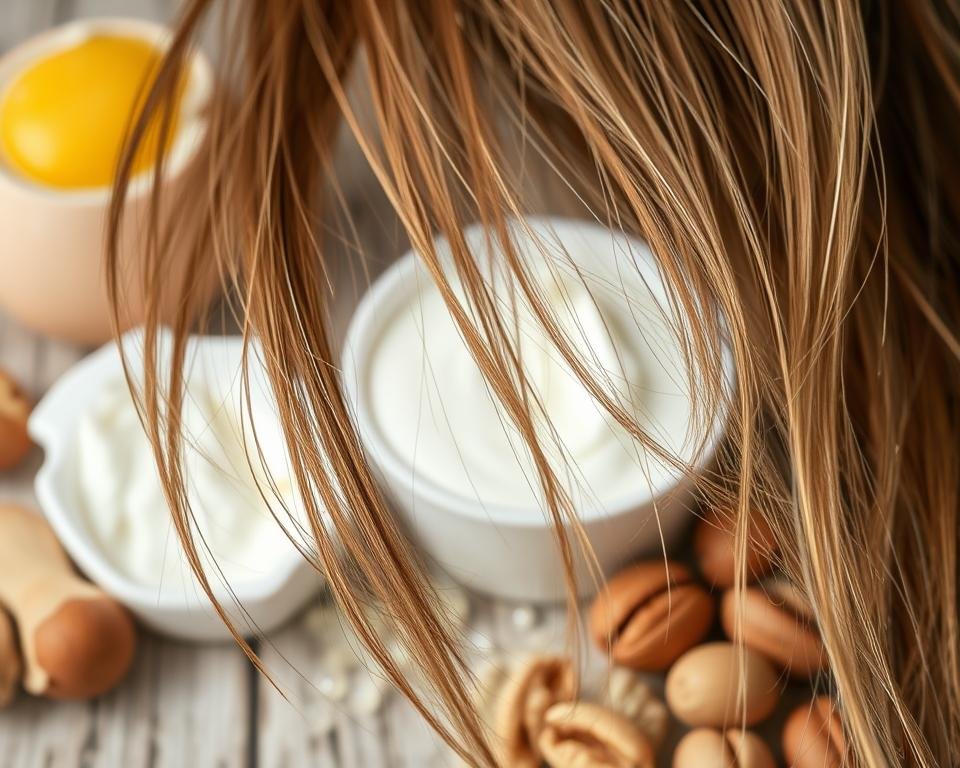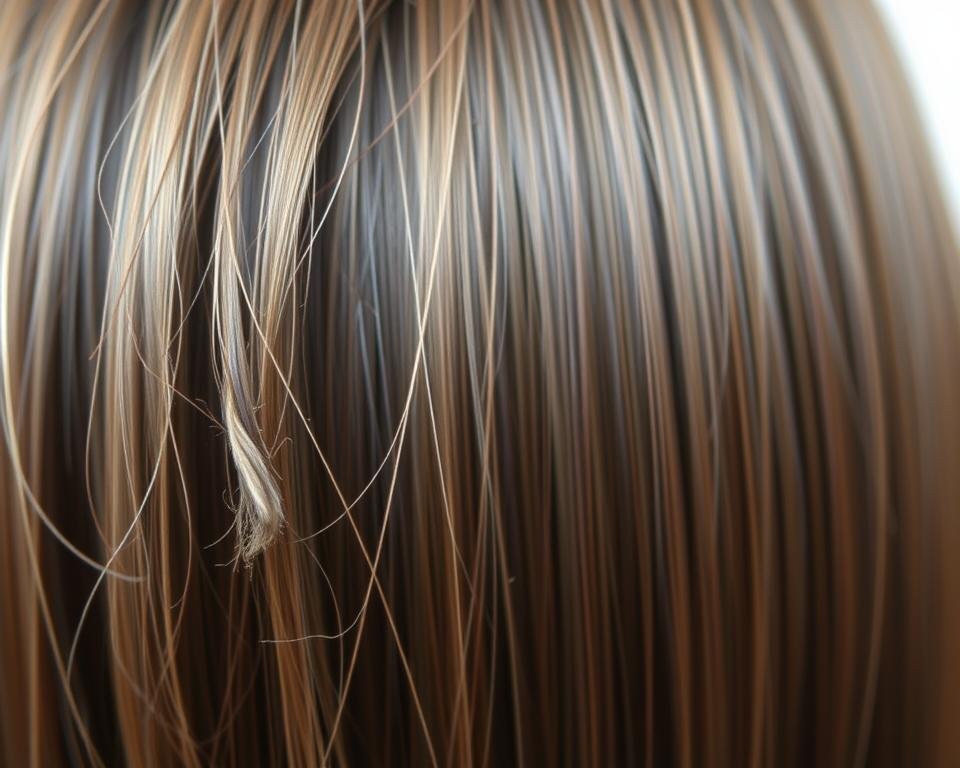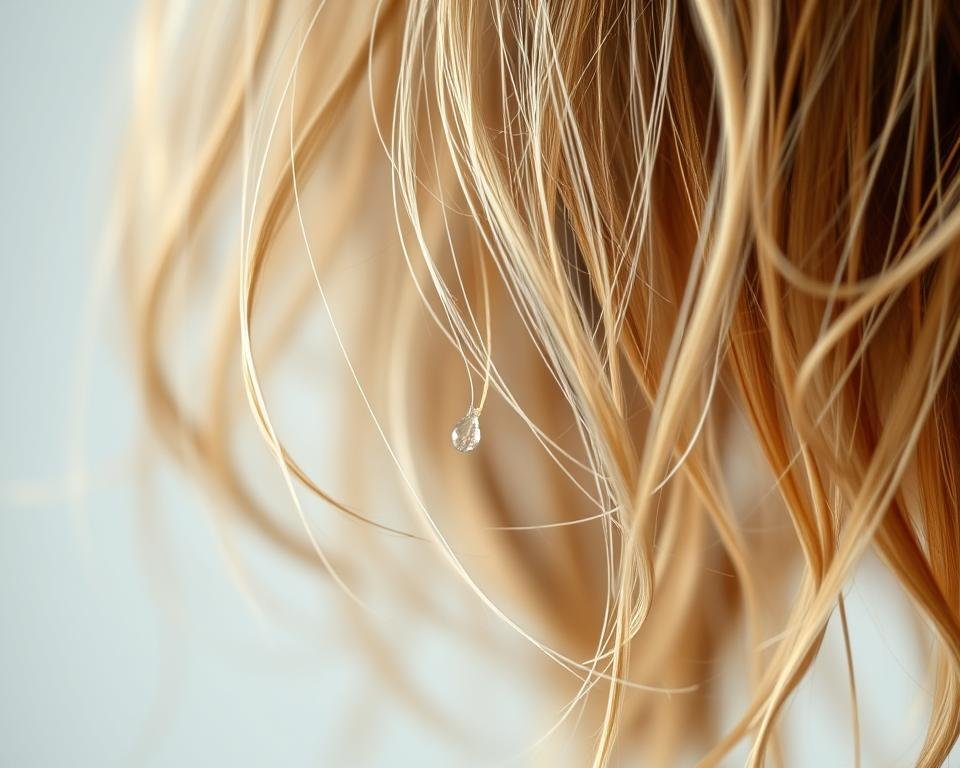Your hair needs a mix of protein and moisture to stay healthy. Protein helps strengthen your hair, making it less likely to break. Moisture keeps your hair smooth and easy to manage.
Finding the right mix of protein and moisture can be tricky. If your hair lacks either, it might become brittle or dull. Signs like limp curls or a dry texture can mean you need to adjust your hair care.
Understanding the Importance of Protein and Moisture
Healthy hair needs a balance of protein and moisture. Proteins are the building blocks of your hair, making it strong and resilient. Without enough protein, your body focuses on other needs, weakening your hair.
Moisture keeps your hair smooth and hydrated. Without it, your hair becomes dry, frizzy, and easily tangled. Both protein and moisture are key for healthy hair – protein strengthens, and moisture keeps it soft.
Protein: The Building Blocks of Healthy Hair
Hair is mostly made of proteins like keratin. Stress, heat, and chemicals can damage these proteins, causing hair loss. It’s important to keep your hair well-proteinated for strength and health.
Moisture: The Key to Soft, Manageable Strands
Moisturizing treatments use fatty acids and oils to hydrate your scalp. These ingredients smooth the hair cuticle, keeping it soft and easy to manage. Without enough moisture, hair becomes rough and damaged.
Signs Your Hair Needs Protein
If your hair feels limp, dull, and lacks bounce, it might need protein. Healthy hair needs a balance of protein and moisture. When this balance is off, hair problems can arise.
Super porous hair is a clear sign of protein deficiency. Hair strands with tears and gaps absorb moisture quickly. This leads to frizzy, tangled hair.
Lack of elasticity is another protein need indicator. The wet strand test shows if hair stretches a lot before breaking. Healthy hair stretches and bounces back without breaking.

Chemical treatments like bleaching and coloring can reduce hair’s protein. This makes hair more prone to breakage. Increased shedding or sticky hair strands are signs of protein loss.
To fix protein deficiencies, use protein-rich hair masks or serums. Ingredients like hydrolyzed rice protein can strengthen hair. Recognizing protein-deficient hair signs helps you revive and maintain healthy hair.
How Do I Know If My Hair Needs Protein
Figuring out if your hair needs protein or more moisture can be tricky. But, there are clear signs to watch for. One easy way to check is the wet strand test. Wet a hair strand and gently pull it. Healthy hair stretches a bit and bounces back.
If the strand stretches a lot and breaks, your hair might lack protein. Excessive hair shedding is another sign. Losing more than 100 hairs a day could mean your hair needs more protein.
Limp, mushy, or stringy hair also points to a protein shortage.
“Highly porous hair may indicate a need for protein treatments. A balanced hair may only require a protein treatment 1-3 times a year.”
But, if your hair is dry, rough, and tangles easily, it might need more moisture. Symptoms of moisture deficiency include dry, rough hair and prone tangles. For protein imbalance, look for products with wheat, soy, silk, or rice proteins.
Getting the right mix of protein and moisture is essential for healthy hair. A strand test can show if your hair needs more protein or moisture. With the right treatments, your hair will stay healthy and look great.

Signs Your Hair Needs Moisture
If your hair is dry and damaged, it’s probably missing moisture. One sign is when your hair splits and breaks easily, mainly at the ends. This happens because dry hair is more likely to split along the hair shaft.
Another sign is dull, brittle hair, which is common after coloring or chemical treatments. Hair that lacks shine is a clear sign of dehydration. Also, if your hair frizzes a lot or it’s hard to keep your curls, it might be dry.
A dry, flaky scalp is another indicator. A dehydrated scalp can cause irritation. This can harm your hair’s health and look.

To fix dry hair, try pre-poo treatments, the LOC method, and deep conditioning. These steps can make your hair soft, easy to manage, and healthy-looking again.
Does My Hair Need Protein or Moisture?
When it comes to hair care, one question often arises: does my hair need protein or moisture? This is a crucial distinction to make because both play significant roles in maintaining the health and vitality of your hair. Understanding your hair’s unique needs can help prevent breakage, enhance manageability, and promote overall hair health. The balance between protein and moisture is vital; too much of one can lead to issues that may compromise the other, leaving your locks feeling dry or brittle.
To determine whether your hair needs protein or moisture, you should consider its current condition and behavior. Protein is essential for strengthening the hair shaft, so if you notice excessive breakage, a lack of elasticity, or strands that feel mushy when wet, it may indicate that your hair is in need of protein. On the other hand, signs of dryness, frizziness, or a rough texture often suggest a need for moisture. You can also perform a simple elasticity test: take a wet strand of hair and gently stretch it. If it bounces back, your hair has good elasticity and moisture. However, if it breaks easily, it may be time to seek out protein treatments for your strands.
The type of treatments you choose can greatly affect how your hair responds. Protein treatments work to fill in any gaps in the hair cuticle, making it stronger and more resilient. However, if you already have protein treated hair, be cautious not to overdo it, as this can lead to a stiff and brittle texture. Moisturizing treatments, like deep conditioning masks, are perfect for hydrating and replenishing your hair’s moisture levels, restoring a soft and supple feel. Understanding these dynamics will ensure you create a personalized hair care routine that truly meets the needs of your hair.
Achieving the right balance between protein and moisture is an ongoing process, as your hair’s needs can change based on factors like weather, styling habits, and even your overall health. Regularly assessing and adjusting your approach is key. Pay attention to how your hair feels and looks after each treatment, and be ready to pivot between moisture and protein as necessary. By doing so, you’ll nurture your hair and keep it looking its best, no matter the circumstances.
Balancing Protein and Moisture
Getting the right mix of protein and moisture is key for healthy hair. You need to know your hair’s porosity first. Fine hair needs more protein, while coarse hair needs less.
It’s vital to use both protein and moisture products in your routine. This keeps your hair strong and manageable.
Identifying Your Hair’s Porosity
Hair porosity shows how well your hair takes in moisture. A simple water test can tell you your porosity. Just put a hair strand in water.
If it sinks, your hair is high porosity and absorbs moisture easily. If it floats, your hair is low porosity and holds moisture poorly. Knowing this helps you choose the right treatments.
Incorporating Protein and Moisture-Rich Products
Look for keratin, collagen, and hydrolyzed proteins to strengthen your hair. Also, find products with glycerin, aloe vera, and oils for moisture. Switch between protein and deep conditioning treatments.
Too much protein can cause buildup. So, use light protein treatments once a week. Then, follow up with a deep conditioner rich in moisture.
Keeping the right balance of protein and moisture is essential. It makes your hair strong yet soft. By understanding your hair’s porosity and using the right products, you can get healthy, gorgeous hair.
Conclusion
Your hair needs both protein and moisture to stay healthy. Protein makes your hair strong and less likely to break. Moisture keeps it soft and easy to manage.
Finding the right balance is important. Too much or too little of either can damage your hair. By knowing when your hair needs protein or moisture, you can keep it healthy.
Every hair type is different. Whether your hair is fine or coarse, it’s important to know what it needs. Using products rich in protein and moisturizing deep conditioners can help.
By watching how your hair responds, you can adjust your care routine. This ensures your hair gets the right amount of protein and moisture.
Getting the right mix of protein and moisture is key to great hair. With the right approach, you can make your hair strong and beautiful. Follow the tips to create a hair care routine that works for you.
FAQ
How do I know if my hair needs protein?
There are a few key signs your hair may need protein, including breakage, dullness, loss of elasticity, and a rough or straw-like texture.
What are the symptoms of protein-deficient hair?
Brittle, dry, and fragile hair that breaks easily is a common sign of protein deficiency. Your hair may also feel limp or lack volume.
Does my hair need a protein treatment?
Taking a simple “Does my hair need protein?” quiz can help assess if your hair could benefit from a protein-enriched product or treatment.
How can I test if my hair needs protein?
An at-home elasticity test is a good way to check if your hair lacks sufficient protein. Gently stretch a strand of hair – if it breaks quickly, it likely needs protein.
When should I use a protein treatment on my hair?
Use a protein treatment if your hair feels weak, breaks easily, or lacks volume and bounce. Overusing protein can also be damaging, so moderation is key.
What are the benefits of using a protein treatment?
Protein treatments can help strengthen, rebuild, and add flexibility to damaged, over-processed hair, resulting in smoother, healthier-looking locks.
How often should I use a protein treatment?
For most hair types, a protein treatment every 4-8 weeks is typically sufficient. Avoid using them too frequently, as this can lead to protein overload.



